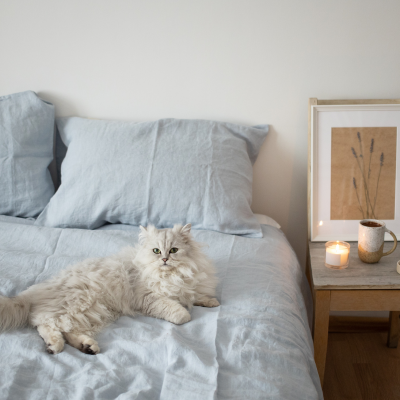Allergy is a very common cause for people to wake up with a blocked nose, or 'nasal congestion' as it might be called. If airborne pollution in your bedroom, such as pollen, dust, mould spores or traffic soot is being inhaled, it can cause an over-reaction of the immune system. Your immune system response might then manifest itself in allergy symptoms, such as a blocked nose. In such an immune response, antibodies are produced and cause congestion, because the the tiny capillary blood vessels in the nose leak fluid. Your nose feels blocked up, it becomes harder to breathe and you might wake up with a blocked nose, and possibly a headache.
But why do I wake up with a blocked nose every morning?
You might wake up with a blocked nose because general air pollution is present in your bedroom environment. Such pollution can come from indoor, or outdoor sources. In this post, we will explain what you can do to control airborne pollution in your home. If they cause your allergy symptoms, controlling them might help to reduce your allergy symptoms so that you do not wake up with a blocked nose anymore.
House dust mite
One common allergen to cause blocked noses is dust mite allergen. The droppings of the house dust mite contain allergens and, since the droppings are only a few microns in size, they easily become airborne and be inhaled. The dust mites favourite habitat in a home are carpets, bedding and mattresses. Therefore, night time is prime time for dust mite allergen. Exposure to the allergen - especially over a longer period of time - can irritate your immune system so that you wake up with a blocked nose in the morning as a result.
To help control dust mite allergens in your home, you might want to use allergy friendly cleaning products. A good allergy cleaning product naturally destroys dust mite allergens on contact. It is also recommended to wash your bedding regularly with an allergy laundry detergent and to dry it thoroughly (mites flourish in even slightly damp conditions). You might also want to consider in investing in a new mattress, pillows, and duvet. Hard flooring, rather than carpet, in the bedroom, is a plus when it comes to allergies, as they are mostly easier to keep clean. It helps to damp dust regularly and keep clutter - which collects dust - to a minimum.
Traffic pollution
Traffic pollution can be a common cause in people waking up with a blocked nose as it can causes perennial rhinitis. The main components of traffic pollution are ground-level ozone, particulate matter such as ultra fine dust, and nitrogen oxides. These pollutants can have an irritant effect on the respiratory tract and can enter a bedroom through cracks in the windows and walls or directly through the window when ventilating. You have less control over outdoor pollution, but you can effectively control air pollution in your home with an effective air purifier. An effective, leakage free air cleaner fitted with a High-Efficiency Particulate Air (HEPA) filter will capture and retain virtually all particulate pollution, including pollen, mould spores, viruses, bacteria, dust mite allergens and diesel soot.


However, there can of course be other, non-allergic causes that might make you wake up with a blocked nose. Such as sinusitis, colds and flu, nasal polyps and a condition called vasomotor rhinitis.




